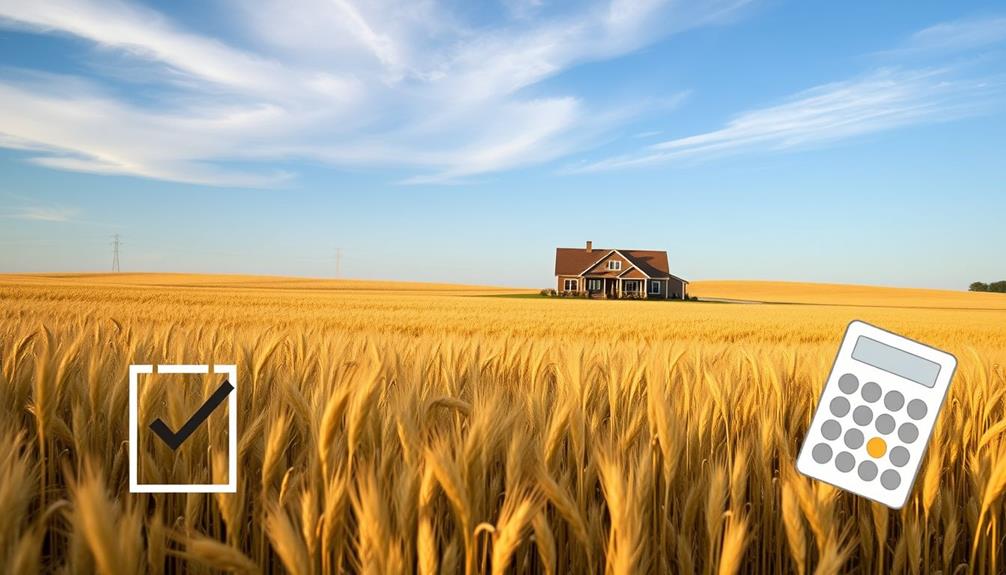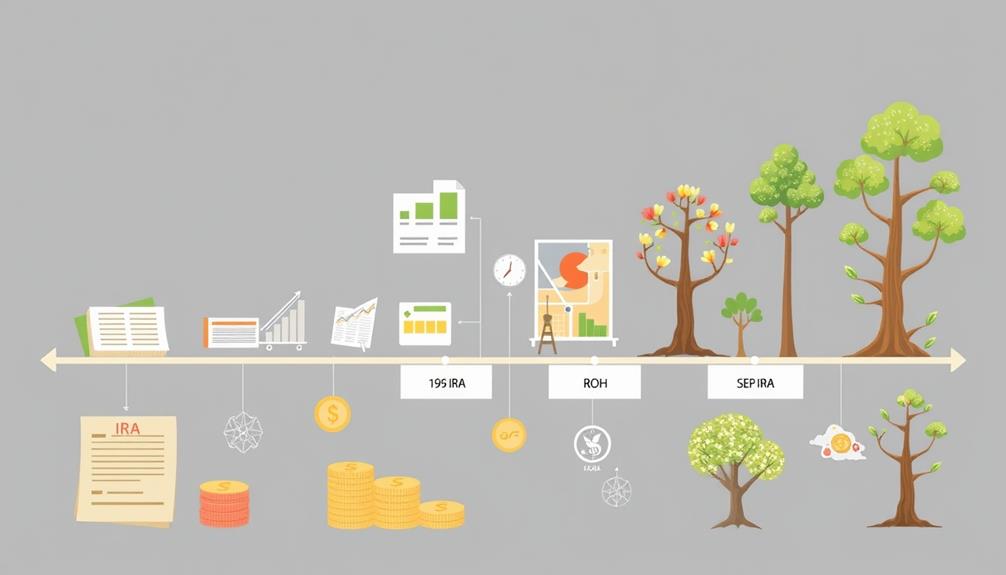Integrating IRAs with state-specific benefits is crucial for your retirement planning in Kansas. Traditional or Roth IRAs can be used to maximize tax advantages, with Traditional IRAs offering deductible contributions and Roth IRAs providing tax-free withdrawals. Kansas also exempts Social Security benefits from state taxes, which can enhance your retirement income. Consider looking into the Kansas Voluntary Retirement Plan for the option of making pre-tax and after-tax contributions. It is important to adhere to state regulations and seek personalized assistance from providers like TIAA and Voya. Having a good understanding of these elements can help you optimize your retirement opportunities and ensure a secure future with more possibilities on the horizon.
Key Takeaways
- Kansas residents can benefit from both Traditional and Roth IRAs, with contribution limits of $7,000 or $8,000 for those aged 50 and over in 2024.
- The Kansas Voluntary Retirement Plan offers tax advantages with both pre-tax and after-tax contribution options, enhancing retirement savings.
- Social Security benefits are exempt from state taxes in Kansas, increasing the overall retirement income for residents.
- Employers must comply with state regulations to offer retirement plans, ensuring employees have access to savings options like IRAs and 401(k)s.
- Working with financial advisors can optimize retirement strategies, targeting a sustainable replacement rate of up to 80% of pre-retirement income.
Understanding IRAs in Kansas

When planning for retirement in Kansas, it's essential to understand how individual retirement accounts (IRAs) can benefit you. IRAs serve as a powerful retirement savings plan, allowing you to make tax-deductible contributions that can greatly boost your savings.
For 2024, the contribution limits are set at $7,000 for those under 50 and $8,000 for individuals aged 50 and over. This higher limit encourages you to save more as retirement approaches.
In Kansas, traditional IRAs offer tax-deferred growth, meaning you won't pay taxes on your contributions or earnings until you withdraw them. This feature maximizes your investment's growth potential.
If you anticipate being in a higher tax bracket during retirement, consider a Roth IRA. It permits tax-free withdrawals, giving you flexibility and peace of mind when accessing your funds.
Additionally, since Kansas doesn't tax Social Security benefits, combining these benefits with your IRA can enhance your retirement income.
State-Specific Retirement Benefits

In Kansas, you've got some solid retirement plan options that cater to your unique needs.
With a Voluntary Retirement Plan offering both pre-tax and after-tax contributions, you can customize your savings strategy.
Plus, understanding state compliance requirements will help you make the most of these benefits and secure your financial future.
Kansas Retirement Plan Options
Kansas offers a variety of retirement plan options designed to meet the needs of its workforce. One of the key choices is the state-mandated retirement plans, which provide tax advantages similar to Roth IRAs. These plans are particularly beneficial for low to moderate-income workers, helping to close the savings gap often faced by employees in smaller businesses.
You can take advantage of the Voluntary Retirement Plan, where you can make employee contributions through pre-tax and after-tax options. Providers like TIAA and Voya, approved by the Kansas Board of Regents, facilitate these contributions. Enrollment is straightforward, requiring just a Salary Reduction Agreement form to get started.
Additionally, Kansas retirement plans offer flexibility, allowing for loans and hardship withdrawals under specific conditions. This flexibility is essential if you encounter financial difficulties, ensuring you have access to your savings when needed.
State Compliance Requirements
Understanding the state compliance requirements is vital for employers considering retirement plan options in Kansas. While the state doesn't mandate retirement plans, you must still adhere to federal regulations, particularly if you choose to establish a retirement plan under ERISA standards. This guarantees that your plan meets all necessary compliance requirements.
As a small business owner, you have several options at your disposal:
- You can participate in state-sponsored retirement plans or private market plans, like 401(k)s.
- It's important to stay informed about potential retirement legislation since discussions about mandates are ongoing in various states.
- Make certain to understand your responsibilities regarding contributions made by eligible employees and the tax benefits associated with these plans.
- Consider consulting an Investment Advisory for guidance on optimizing your retirement offerings.
Tax Advantages for Retirees

When planning for retirement in Kansas, you'll want to evaluate the tax advantages available to you.
From tax-deductible contributions to traditional IRAs to the benefits of Roth IRAs, these options can greatly impact your retirement income.
Additionally, if you're exploring options like rolling over your 401k into a Gold IRA, you can potentially enjoy tax advantages when shifting retirement funds.
Plus, with Kansas not taxing Social Security benefits, you can keep more of what you earn during your retirement years.
IRA Tax Benefits
Maximizing your retirement savings through IRAs can lead to significant tax benefits, especially for retirees in Kansas. By utilizing Roth IRAs and Traditional IRAs effectively, you can enhance your tax-advantaged savings and retirement income. Here are some key points to take into account:
- Roth IRAs: Contributions are made with after-tax dollars, allowing for tax-free withdrawals during retirement. This can be especially beneficial given Kansas's relatively lower tax rates on retirement income.
- Traditional IRAs: You can make tax-deductible contributions, which reduces your taxable income for the year. This feature is advantageous for Kansas residents wanting to lower their current tax burden.
- Contribution Limits: For 2024, you can contribute up to $7,000 if you're under 50 and $8,000 if you're 50 or older, maximizing your tax-advantaged savings.
- Social Security Benefits: Kansas doesn't tax Social Security benefits, letting you withdraw from your IRAs without incurring additional state taxes, potentially increasing your overall retirement income.
Additionally, rolling over funds from employer-sponsored plans into IRAs can be done without tax penalties, further supporting your retirement planning.
State Incentives Overview
Kansas offers several tax advantages that can greatly benefit retirees, enhancing their financial well-being. One of the most notable incentives is the state income tax exemption for Social Security benefits, allowing you to keep more of your retirement income.
Additionally, if you're contributing to traditional IRAs, you can take advantage of a tax deduction that reduces your taxable income, making your financial planning more effective.
For those aged 55 and older, Kansas provides a property tax exemption for the first $20,000 of your home's appraised value, which can markedly lower your housing expenses during retirement.
Furthermore, contributions to Roth IRAs, made with after-tax dollars, offer a notable tax advantage since qualified withdrawals, including earnings, are tax-free.
The state retirement plans, like the Kansas Board of Regents Voluntary Retirement Plan, also enhance your savings by providing tax-deferred growth on investments.
By integrating these state-specific benefits into your retirement strategy, you can maximize your financial resources and enjoy a more secure retirement.
With these tax advantages, Kansas truly supports retirees in their financial planning efforts.
Retirement Income Strategies
Many retirees find that effective income strategies can greatly enhance their financial security during retirement. By utilizing tax advantages associated with IRAs, especially Roth IRAs, you can enjoy tax-free qualified distributions, keeping your retirement income intact without increasing tax liabilities.
Additionally, investors may consider diversifying their portfolios with precious metals through trusted Gold IRA options, which can serve as a hedge against inflation. Kansas also offers favorable tax policies, allowing exemptions on certain retirement income, including Social Security benefits, which boosts your disposable income.
To maximize your financial stability, consider these strategies:
- Contribute to IRAs: In 2024, the contribution limit for IRAs is $7,000 ($8,000 for those 50 and over), allowing you to increase your tax-advantaged savings.
- Develop a diversified income strategy: Combine different retirement accounts to mitigate tax exposure while ensuring a steady income stream.
- Utilize tax credits: Kansas provides tax credits for low-income retirees, improving your financial situation and retirement income management.
- Plan for withdrawals wisely: Strategically timing your withdrawals can optimize your tax advantages and maintain financial stability throughout retirement.
Strategies for Effective Retirement Planning

Effective retirement planning hinges on understanding the various options available to you, especially within Kansas's unique landscape. Start by exploring state-sponsored retirement programs like the Kansas Board of Regents' Voluntary Retirement Plan. This plan offers both pre- and after-tax options, allowing you to tailor your contributions according to your financial situation as an employee.
For small businesses, participating in these plans can provide significant tax advantages while boosting employee satisfaction. You can also consider investing in personal retirement accounts like 401(k)s, which often come with higher contribution limits and potential employer matching.
To maximize your retirement savings, diversify your investment options. Combining state-sponsored IRAs with other retirement plans can enhance your growth potential over time.
Additionally, work with financial advisors who can help analyze your expected income needs during retirement, targeting a replacement of up to 80% of your pre-retirement income.
Compliance With State Regulations

Understanding state regulations is a key part of retirement planning for employers in Kansas. If you have five or more employees, you're required to offer a retirement savings plan, which can include options like Roth IRAs. It's essential to stay informed about compliance deadlines that vary depending on your employee count.
To guarantee compliance with state regulations, consider the following:
- Registering your retirement plan promptly to avoid penalties.
- Implementing an auto-enrollment feature to enhance employee participation.
- Setting up your payroll system to manage automated deductions for contributions.
- Regularly reviewing state regulations to keep up with any changes.
Failing to comply with these mandates can lead to penalties ranging from $20 to $500 per employee, depending on the violation.
By actively monitoring compliance and ensuring your plan meets all state requirements, you not only protect your business from fines but also foster a culture of retirement savings among your employees.
This proactive approach not only secures your organization's financial future but also contributes positively to your employees' long-term financial well-being.
Don't underestimate the importance of understanding and adhering to these regulations!
Resources for Kansas Residents

When it comes to retirement planning, Kansas residents have access to a variety of valuable resources designed to support their financial goals. One key option is the Voluntary Retirement Plan, which offers both pre-tax and after-tax contribution plans through approved providers like TIAA and Voya. These plans allow you to maximize your savings while benefiting from tax advantages.
The Kansas Board of Regents also provides a Retirement Plan Guide, which serves as an essential resource for understanding enrollment processes and investment advice. You can learn about hardship withdrawals, which are allowed under specific conditions, ensuring you have access to funds when necessary. Just remember to complete a new Hardship Request Form to tap into those resources.
Additionally, you can take full advantage of IRS contribution limits, which for 2024 are $7,000 for IRAs and $23,000 for 401(k) plans. This means you can considerably boost your retirement savings.
If you need personalized assistance, TIAA and Voya offer scheduled appointments and co-browsing support to help you navigate your retirement plans effectively. Make the most of these resources to secure your financial future in Kansas!
Frequently Asked Questions
Can You Combine State and Federal Retirement?
Yes, you can combine state and federal retirement options. By integrating various plans, you'll maximize savings potential and take advantage of different tax treatments, enhancing your overall retirement strategy for a more secure financial future.
What Is the Pension Program for the State of Kansas?
The pension program for Kansas state employees is KPERS. It's a defined benefit plan where your retirement benefits depend on your service years and final salary. The state contributes around 14.7% of payroll towards it.
What Is the KPERS Rule of 85?
Think of the KPERS Rule of 85 as a finish line. You can retire with full benefits when your age plus years of service equals 85, ensuring a smoother shift into your golden years.
What State Has the Best State Retirement Plan?
When considering the best state retirement plan, California stands out with its CalSavers program. Auto-enrollment and a solid contribution rate make it easy for you to save effectively for your future retirement needs.
Conclusion
Incorporating IRAs with Kansas-specific benefits can make a big difference in your retirement planning. For instance, imagine Sarah, a 55-year-old teacher in Topeka. By strategically using her traditional IRA alongside Kansas's tax exemptions for retirement income, she maximizes her savings while minimizing her taxes. By staying informed and compliant with state regulations, you too can create a robust retirement strategy that secures your financial future in the Sunflower State. Start planning today!









